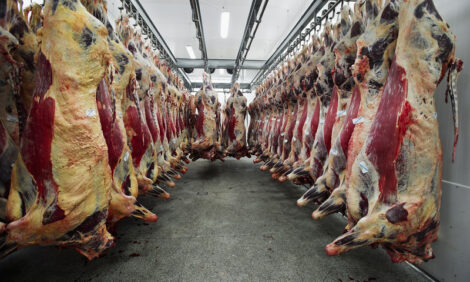



Bismarck, N.D., Regional Meeting Just Days Away
US - R-CALF USA Region III Director Johnny Smith, an auctioneer and partner at Ft. Pierre Livestock Auction, Inc., in Fort Pierre S.D., will host one of the organization’s regional meetings from 1 p.m. to 4 p.m. CST, Saturday, Nov. 18, at the AmVets Club on 2402 Railroad Ave.(east on Main to 25th South – 1 block), in Bismarck, N.D.“R-CALF is promoting price discovery at its finest, and price discovery is what makes our markets competitive,” he continued. “R-CALF keeps a very prominent and close watch on USDA and all parts of government that would affect the cattle market.”
R-CALF USA President and Region V Director Chuck Kiker, a cattle rancher and rice farmer from south Texas, will present a report on animal identification. He will update the crowd on recent meetings in Washington, D.C., with USDA’s Under Secretary for Marketing and Regulatory Programs Bruce Knight, APHIS Administrator Ron DeHaven and APHIS Chief Veterinarian John Clifford concerning USDA’s implementation of a voluntary Animal ID system. Kiker also will discuss his fact-finding trip this past spring to Australia to observe the country’s mandatory National Livestock Identification System, as well as Australia’s beef and live cattle industries.
“What is most disappointing is the U.S. cattle industry has always been a world leader, and now it seems we are following and letting other countries and multinational corporations dictate how we address animal health issues in the U.S.,” Kiker remarked. “In all the other countries that have tried to implement an Animal ID system, those efforts have been very problematic and expensive, with varying degrees of success at meeting objectives.
“Our animal heath officials have done an excellent job of protecting the U.S. food supply with the methods of disease control we have practiced in the past,” Kiker noted. “We are certainly going to have to address the concerns of animal health officials in relation to Animal ID, so we need to come up with reasonable solutions. Animal ID needs to incorporate tracking systems already in place and utilize advances in technology. By becoming more innovative, we should be able to come up with a voluntary Animal ID system that increases the value of our cattle and monetarily encourages participation. This will allow us to again become a world leader in animal health and food safety.”
R-CALF USA Director of Government Relations Jess Peterson, a fifth generation Montana cattle producer, will inform participants about the organization’s activities in Washington, D.C., and how member involvement is crucial to the success of the U.S. cattle industry.
“Participation in cattle-industry association meetings like these truly makes the difference,” Peterson said. “This meeting will give the busy rancher an opportunity to catch up on the issues so they’ll be able to positively influence the direction of this industry.
“By holding both your industry association and your elected officials accountable, a single voice can make a difference,” he continued. “R-CALF USA provides the path for producers to take to ensure their interests and messages are being delivered to our nation’s capital.”
R-CALF USA CEO Bill Bullard, formerly a cow/calf rancher in Perkins County, S.D., will present an overview of the multi-segmented U.S. cattle industry and provide the organization’s producer-oriented plan designed to keep the independent-producers’ segment of the industry viable and profitable.
“U.S. cattle producers built their industry into the single largest segment of American agriculture,” said Bullard. “They did this by defending their values for independence and their principle of maintaining open and competitive markets.
“Only if cattle producers unite under a strong national organization that represents their interests exclusively can we expect to ensure that our industry remains comprised of hundreds of thousands of independent small businesses who, individually, determine the terms of their production, the terms of their marketing, and who rely on a competitive market for their income,” Bullard explained. “The push by the nation’s largest meatpackers to vertically integrate the U.S. cattle industry by exerting ever-increasing control over the production sector is real. Unless we unite to change the present course of this industry, the future profitability for independent producers will remain threatened.”
TheBeefSite.com News Desk


